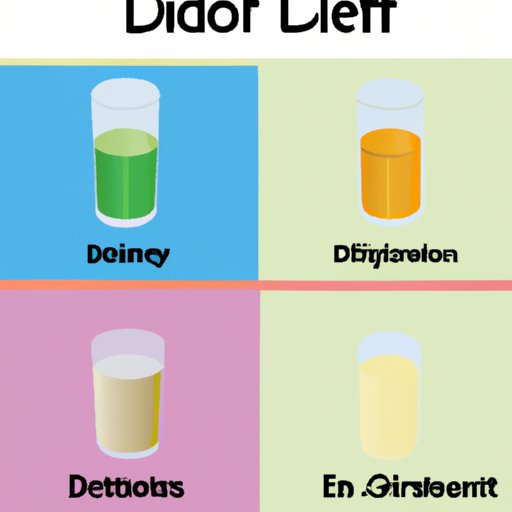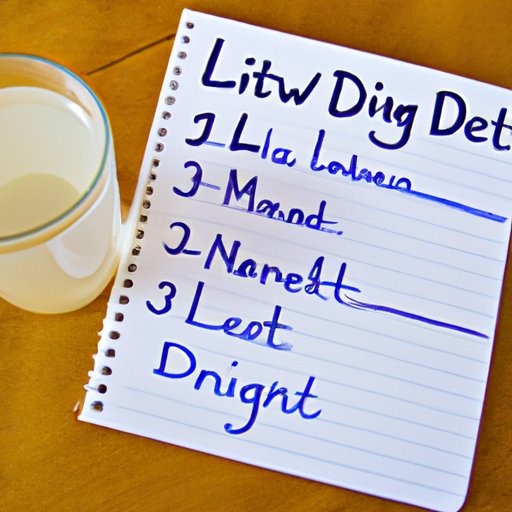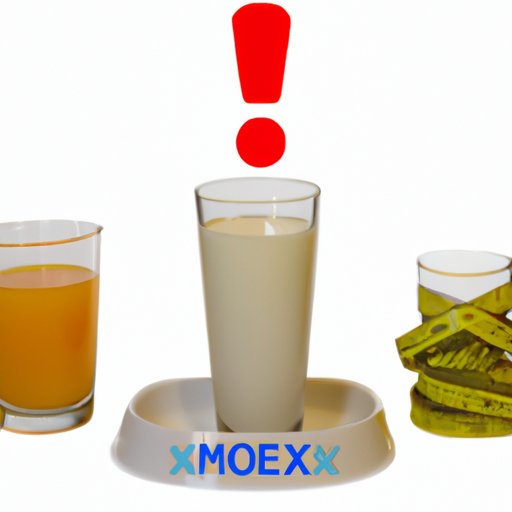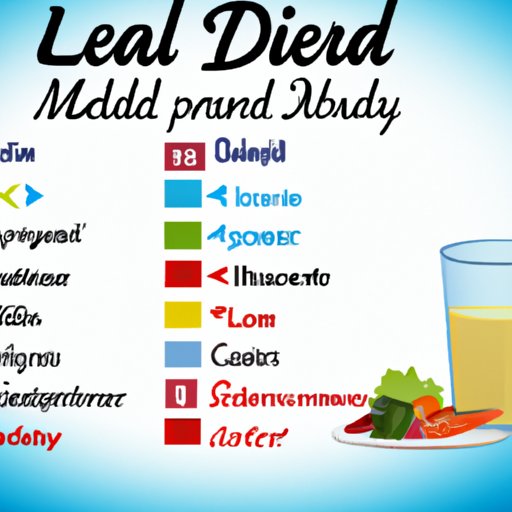Introduction
A liquid diet consists of consuming only liquids for a period of time. It can be used as part of a weight loss plan or as a way to detoxify the body. Liquid diets are also sometimes recommended after surgery or when someone has difficulty eating solid food due to an illness or injury. While there are potential benefits to following a liquid diet, it is important to understand the potential risks and how to safely follow one.

Exploring the Different Types of Liquid Diets
There are three main types of liquid diets: clear liquid diets, full liquid diets, and modified liquid diets. Each type has specific guidelines regarding which foods and beverages are allowed.
Clear Liquid Diet
A clear liquid diet consists of only clear liquids and foods that turn into a clear liquid at room temperature, such as gelatin. This type of diet is typically prescribed for short periods of time, such as before a medical procedure. It does not provide enough calories or nutrients for long-term use. Foods and beverages allowed on a clear liquid diet include:
- Water
- Fruit juices without pulp
- Gelatin
- Broth
- Tea or coffee without cream
- Sports drinks
Full Liquid Diet
A full liquid diet consists of liquid or semi-solid foods that are easy to swallow and digest. This type of diet may be recommended for people who need to rest their digestive system, such as after surgery. Foods and beverages allowed on a full liquid diet include:
- Milk and other dairy products
- Smoothies
- Soups
- Strained fruits and vegetables
- Protein shakes
- Jell-O and other gelatin desserts
Modified Liquid Diet
A modified liquid diet combines both clear and full liquid foods. This type of diet is often prescribed for people who need to lose weight but still need to get adequate nutrition. Foods and beverages allowed on a modified liquid diet include:
- Creamy soups
- Yogurt
- Fruit and vegetable juices
- Smoothies with added ingredients such as nuts, seeds, and nut butter
- Pudding
- Ice cream

How to Successfully Follow a Liquid Diet
When following a liquid diet, it is important to take steps to ensure you are getting adequate nutrition and staying hydrated. Here are a few tips for successfully following a liquid diet:
Meal Planning and Preparation
Planning your meals and snacks ahead of time can help you stay on track and make sure you are getting all the essential nutrients your body needs. A registered dietitian can help you create a meal plan tailored to your individual needs.
Portion Control
It is important to pay attention to portion sizes when following a liquid diet. Consuming too much sugar or fat can lead to weight gain, while consuming too few calories or nutrients can lead to deficiencies. A registered dietitian can help you determine appropriate portion sizes.
Staying Hydrated
Staying hydrated is essential for good health and can help prevent dehydration, fatigue, and headaches. Aim to drink at least 8 glasses of water each day, and avoid drinking sugary beverages like soda and juice.
The Nutritional Impact of a Liquid Diet
A liquid diet can provide the necessary vitamins and minerals needed for good health, but certain nutrients, such as protein and fiber, may be lacking. Here is a look at the nutritional impact of a liquid diet.
Vitamins and Minerals
Liquid diets can provide the necessary vitamins and minerals needed for good health. However, it is important to include a variety of nutrient-dense foods, such as fortified milk and fruit juices, to ensure you are getting all the essential vitamins and minerals your body needs.
Protein Intake
Protein is an essential nutrient for building and maintaining muscle mass. Protein shakes and other protein-rich liquids, such as Greek yogurt and milk, can help boost your protein intake. Additionally, adding nuts and seeds to smoothies can help increase your protein intake.
Caloric Intake
It is important to limit your caloric intake when following a liquid diet. According to a study published in The American Journal of Clinical Nutrition, liquid diets that provide 500-800 calories per day can be effective for weight loss. However, it is important to speak with a healthcare professional before beginning any diet.

What to Expect When Going on a Liquid Diet
It is important to understand the potential benefits and risks of following a liquid diet. Here is a look at what to expect when going on a liquid diet.
Weight Loss
One of the most common reasons people go on a liquid diet is to lose weight. According to a study published in the journal Obesity, liquid diets can be effective for short-term weight loss. However, it is important to note that this type of diet is not recommended for long-term use.
Side Effects
Following a liquid diet can lead to unwanted side effects, such as constipation, dizziness, and fatigue. It is important to speak with a doctor or dietitian before starting a liquid diet to ensure it is safe for you.
Long-Term Results
It is important to be realistic about the results you can expect from following a liquid diet. While liquid diets can be effective for short-term weight loss, they do not offer lasting results. A healthy lifestyle that includes regular physical activity and eating a balanced diet is the best way to maintain a healthy weight in the long run.
Conclusion
A liquid diet consists of consuming only liquids for a period of time. There are three main types of liquid diets: clear liquid diets, full liquid diets, and modified liquid diets. It is important to understand the potential benefits and risks of following a liquid diet, as well as how to successfully follow one. A liquid diet can provide the necessary vitamins and minerals needed for good health, but certain nutrients, such as protein and fiber, may be lacking. Following a liquid diet can lead to short-term weight loss, but it is important to be realistic about the results you can expect from it. It is important to speak with a doctor or dietitian before beginning any diet to ensure it is safe for you.
(Note: Is this article not meeting your expectations? Do you have knowledge or insights to share? Unlock new opportunities and expand your reach by joining our authors team. Click Registration to join us and share your expertise with our readers.)
